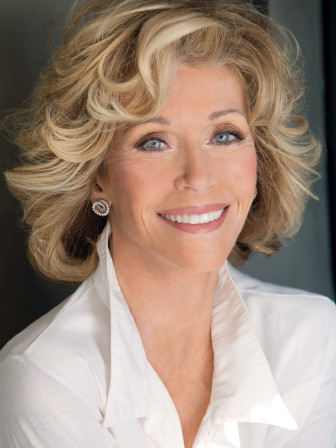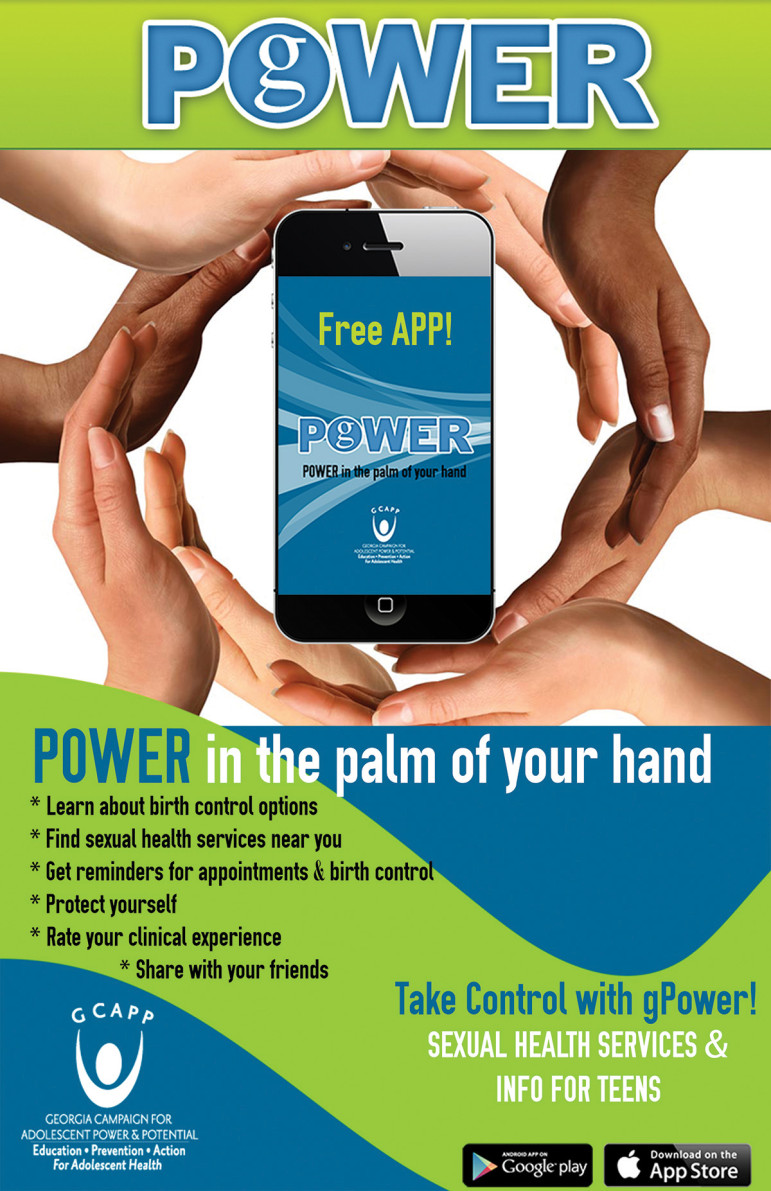
Photo courtesy of GCAPP
Georgia Campaign for Power & Potential (GCAPP) CEO Kim Nolte is the first to concede that stemming the tide of adolescent pregnancies in rural Georgia has been among the biggest challenges of the nonprofit’s two decades of work in the state. “For years, there were areas where we just couldn’t get any traction,” recalled Nolte. “Even on the days when you want to give up, you keep going because the problems in those areas are so vast.”
As GCAPP marks its 20th anniversary this year, the nonprofit celebrates plummeting teen pregnancy rates and a reputation for becoming a national youth-work model for its education and communication programs, reaching teens around a mostly rural state. Formerly Georgia Campaign for Adolescent Pregnancy Prevention, in 2013 the nonprofit changed its name to reflect an expanded mission that now includes a focus on physical activity, nutrition and healthy relationships along with its teen pregnancy prevention mission.
Teen pregnancies statewide have dropped by 50 percent during the past two decades as GCAPP created sex-education programs for teens, teachers and parents, developed a peer leadership council where young people offer motivation and tips to each other on how to use contraceptives and community resources, and even created a series of noninstitutional group homes to provide counseling and parenting skills to young moms. In 2012, according to statistics compiled by the Georgia Department of Public Health, teen pregnancies fell to 11,444 statewide.
“Counties and organizations are now calling us up, wanting to work together,” said Nolte. “We are working with over 160 organizations in schools to implement really good sex-education programs and teen pregnancy-prevention programs. We work with them long term. We don’t just train them and leave. We provide ongoing assistance. There are only about 15 organizations like us in the U.S., and we’re the largest. Other nonprofits look to us as a leader in this work because we’ve had such strong impacts. That means a lot.”
A rural success with sex ed
One rural success story is GCAPP’s work in Dougherty County, located in the southwest corner of Georgia. After years of overtures, the county has partnered with GCAPP to bring its WISE (Working to Institutionalize Sex Education) initiative to its school system. With the help of Network of Trust, a group of nurses and health advocates at Phoebe Putney Memorial Hospital in Albany, GCAPP is bringing sex-education training to health and physical-education teachers.
[module type=”aside” align=”right”]50% reduction
in birth rate to girls ages 10-19 years old in Georgia. According to the Georgia Department of Public Health it was 35.5 in 1995 and it was 17.0 in 2012 (rate per 1,000 girls).
[/module]“Even though the state teen pregnancy rates were going down by 10 or 12 percent each year, the teen pregnancy rate in Dougherty County was going down by no more than 1 percent at a time,” explained Pascale Alcindor, GCAPP’s WISE project director. “We knew there was still a lot of work to be done helping young people make healthier choices.”
The Dougherty County school board green-lighted the education initiative. Georgia’s policy for sex education is “abstinence plus,” meaning the emphasis is placed on teaching abstinence, and local school boards may choose to cover “medically-accurate information regarding contraception and disease-prevention methods.” The education age ranges from fifth to 12th grade and is taught with parental consent.
“We want young people to be comfortable speaking about their bodies and to make sure they’re comfortable discussing it with medical and biologically accurate terminology,” said Alcindor. “But we work with each school based on what their policy requires.”
In 2009, the birth rate for teens ages 15 to 19 in Dougherty County was 68 babies born per 1,000 teens. In 2012, the number had lowered to 59.7.
“We’re making tremendous strides,” said Angie Barber, director of Network of Trust. “When you’re able to decrease teen pregnancy rates, you increase graduation rates and you increase the employability of young people because they’re continuing to be educated.”
Local approach to a global need
The riddle of how to reach rural clients statewide has been an ongoing puzzle since GCAPP’s inception. She might have two Oscars on her mantel, but GCAPP founder Jane Fonda’s impassioned address to Georgia lawmakers in 1997 — about the new nonprofit she had started in 1995 to help combat teen pregnancy — didn’t sway all lawmakers at the state capitol. After attending a United Nations conference on population and development in Cairo and learning of Georgia’s spiraling teen pregnancy rates in her adopted state, Fonda was inspired to find localized solutions to a global problem. Fact-finding trips across the state led to Fonda looking into the eyes of a 14-year-old in Albany, Ga., in labor with her second child. By the time Fonda went to Georgia’s gold dome (state Capitol) to raise awareness, there were more than 29,000 teen births occurring each year in Georgia, making the state No. 1 in the nation for teen pregnancies by the mid-1990s.

Tony Duran / GCAPP
“It’s very moving to me to see some of the counties in north Georgia and south Georgia where we were not welcomed who are now asking us to come in and help. Partly, that’s because we’ve been around so long and we’ve proven ourselves. The pregnancy rates have dropped,” said GCAPP founder Jane Fonda.
Not all lawmakers welcomed Fonda or her message. Some, especially those from the Georgia’s more conservative rural areas, didn’t appreciate a lecture from CNN founder Ted Turner’s then-wife, a Hollywood liberal they considered a traitor for protesting the Vietnam War.
“There will always be the people who feel it’s not a good idea to give children information, especially when it comes to the issue of sexuality,” Fonda recalled almost two decades later. “They believe that by doing that, we’re encouraging young people to have sex. But all of the research says otherwise. The research tells us that the more children know about their bodies, the more responsible they’ll become.
“But these are the people who don’t like science. They’re not approaching the argument from a public-health perspective but a morality standpoint. They think this is somehow bad for morals. But the playing field is a lot different now in Georgia than when I first went to the gold dome. It’s very moving to me to see some of the counties in north Georgia and south Georgia where we were not welcomed who are now asking us to come in and help. Partly, that’s because we’ve been around so long and we’ve proven ourselves. The pregnancy rates have dropped. People now know that abortion is not a part of what we do. We try to prevent the need for abortion, and people are feeling better about that.”
In addition to its work in Dougherty County, GCAPP is now actively involved in other communities far from Atlanta’s five-county metro area, including Dalton, Gainesville, Augusta and Rome. The nonprofit is even serving the needs of the 25,000 residents of Grady County, tucked away on Georgia’s southwest border.
A multipronged and multimedia approach
Two years ago, Fonda and GCAPP announced a goal of reducing teen pregnancy across Georgia by 50 percent in time for the nonprofit’s 20th anniversary. Fonda credits several factors for achieving the milestone. “Kids are realizing more and more the importance of using protection, not just to prevent pregnancy but to prevent very serious STDs,” Fonda explained. “There’s also LARCs [long acting reversible contraception] out there now. These are incredibly beneficial. There are new technologies out there now (see sidebar below). But the best thing? There’s been more education and conversation. More information is available. And hopefully, GCAPP is a part of that education and conversation.”
Among the challenges GCAPP Vice-President for Programs and Training Shelley Francis faces in rural Georgia is working with far fewer resources than in urban centers, such as clinics and sexual-health organizations. GCAPP’s new G Power app was designed to help fill that void, arming young people with information while supplying instant access to a health worker via live chat.
“The biggest thing I would stress,” said Francis, “is to have a multipronged approach in addressing teen pregnancy. You have to do evidence-based curriculum and provide youth with access to reproductive health services. Those clinics, in turn, need to be youth-friendly. Create an app and use social media to engage young people, whether it’s on Facebook, Twitter, Instagram or the app; this is all very helpful since they’re spending so much time on their phones now.
“You also have to come back to young people multiple times at various points in their development,” Francis said. “You might give them an evidence-based teen-pregnancy prevention program in sixth grade but also come back in eighth grade and then a couple years during high school, where you give them information on clinics, healthy decision-making and goal setting. … You also have to engage the parents and the trusted adults present in their lives. Have a champion or champions in the community who can engage stakeholders, particularly the more challenging ones to really help you navigate the potential landmines while increasing buy-in from community partners and build relationships.”
“Patience is also a virtue. One size doesn’t fit all,” explained Francis. “You have to meet each community where they are. Customize for each community. Patience pays off. It’s a process. It may take years, but with the right folks on the ground in the community, it can happen. If they’re not comfortable diving into the curriculum quite yet, start the conversation, build rapport and create a strategy. Remember to engage the young people in the conversation. They’re the best ones to tell you what their needs are.”
To advance that discussion, Fonda has written her first book for young people, “Being a Teen: Everything Teen Girls & Boys Should Know About Relationships, Sex, Love, Health, Identity & More,” (Random House, $17). The paperback echoes the mantra of Fonda’s two-decade commitment to inspiring young Georgians to make healthier life choices — “Hope is the best contraceptive.”
Nearly 200 hundred miles away from Atlanta, the message resonates loudly with Angie Barber in Albany, Ga. “I’ve worked with young people for most of my life, and Jane is exactly right. Originally, many people in this state, even the lawmakers, didn’t realize how great the needs were in Georgia to help prevent teen pregnancy. It was more about educating people and making them more knowledgeable on the issue of how to help the youth of today make the decisions to not get pregnant, remain in school and to make positive life choices for themselves. And Jane Fonda and GCAPP are the rock stars of this work. We couldn’t have accomplished what we have without them.”
An App for Safer Sex Resources
For 20 years, The Georgia Campaign for Power & Potential’s statewide work has focused on meeting young people where they are. The nonprofit’s new G Power app continues that mission by putting resources into the hands of teens, including a GPS-guided map to nearby health services (including turn-by-turn directions), sample questions to ask your health practitioner, a Yelp!-like ratings system for teen-friendly health services, short informational videos on how to put on a condom and explaining the different types of LARCs for women, and even a live chat function with a health educator.
 Currently, G Power is the only statewide app of its kind in the country, connecting young people to health services and resources in even the most rural areas of Georgia. The goal is to have more than 300 clinics listed on the app by this summer. College students from G-CAPP’s PEER Up Program helped to created the G Power app for other young people. “We love it when the ideas come from the ground up,” said G-CAPP founder Jane Fonda.
Currently, G Power is the only statewide app of its kind in the country, connecting young people to health services and resources in even the most rural areas of Georgia. The goal is to have more than 300 clinics listed on the app by this summer. College students from G-CAPP’s PEER Up Program helped to created the G Power app for other young people. “We love it when the ideas come from the ground up,” said G-CAPP founder Jane Fonda.
Reaching young people in 2015 without harnessing the power of social media and smart-phone apps can be tricky. “This is how young people communicate now, and we wanted to be a part of that conversation,” said G-CAPP CEO Kim Nolte. “They don’t call help lines. They don’t call anybody. They text a message and they expect a text back. Young people also don’t read pamphlets. So we translated that information into videos made by young people for young people.”
Thanks to an ad on the free streaming music service Pandora, in addition to teen-to-teen word of mouth, Nolte reports the G Power app was downloaded 400 times and the ad generated 1,800 hits on the gcapp.org website in just one week.
Said Nolte: “The G Power app is another way for us to empower young people and give them a voice about their health.”


























